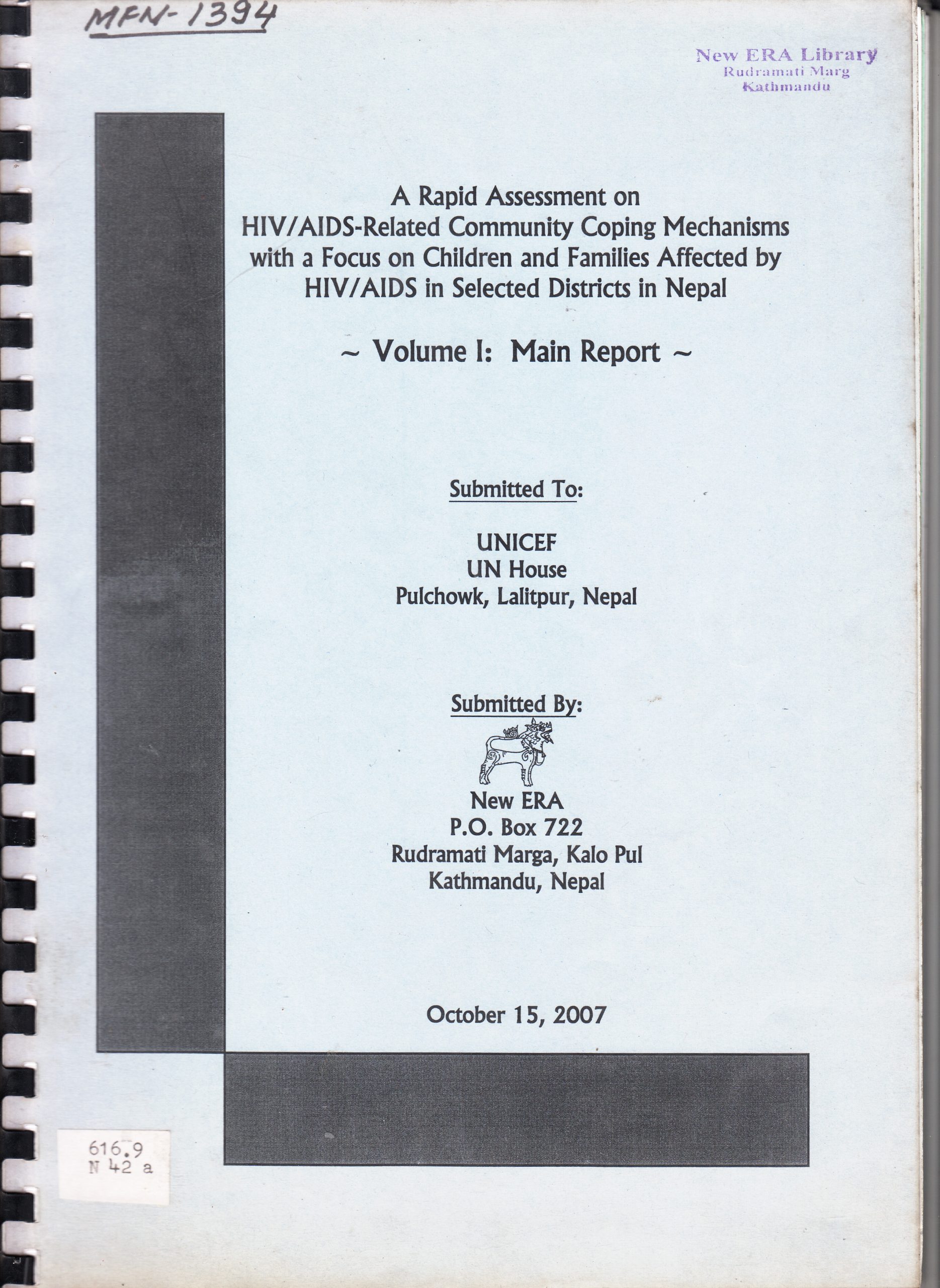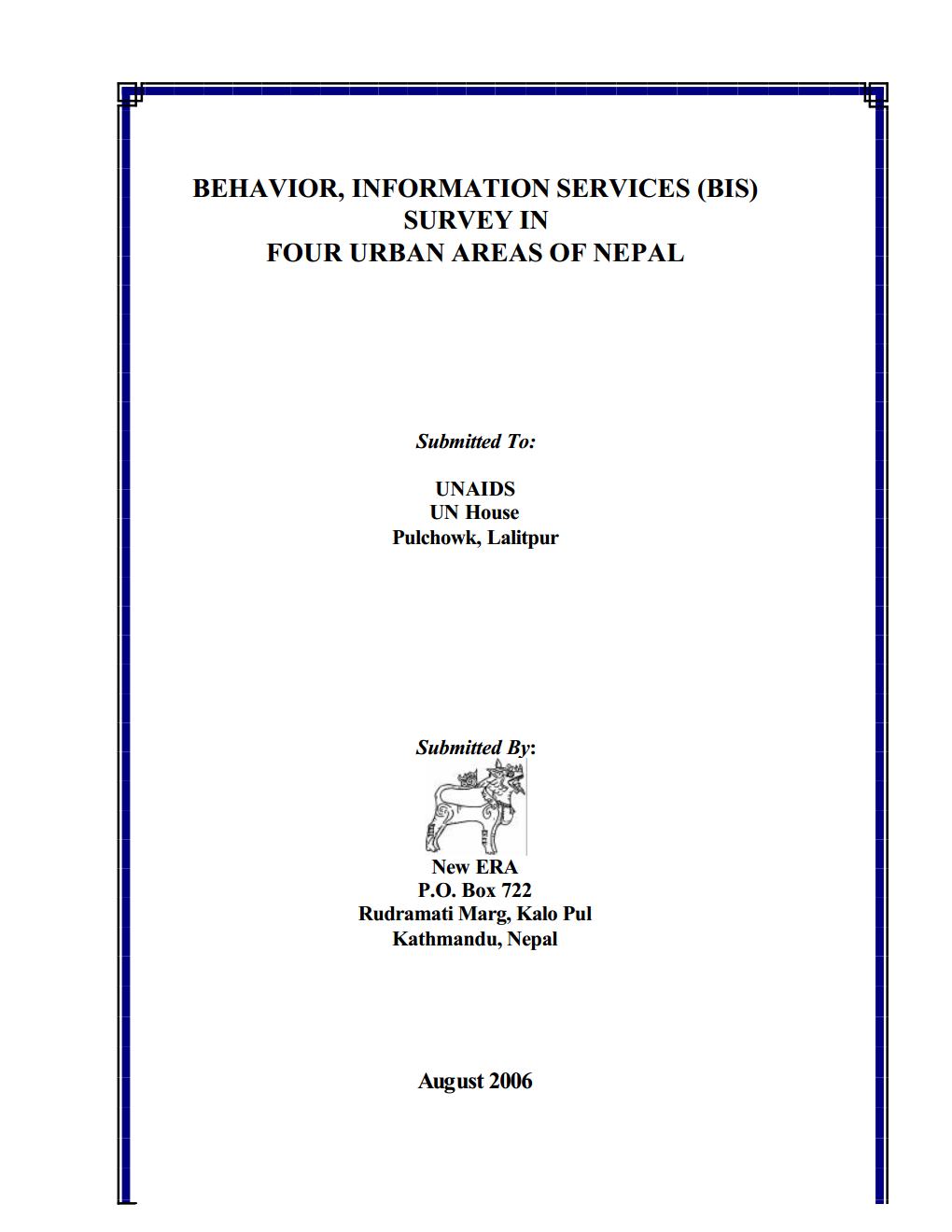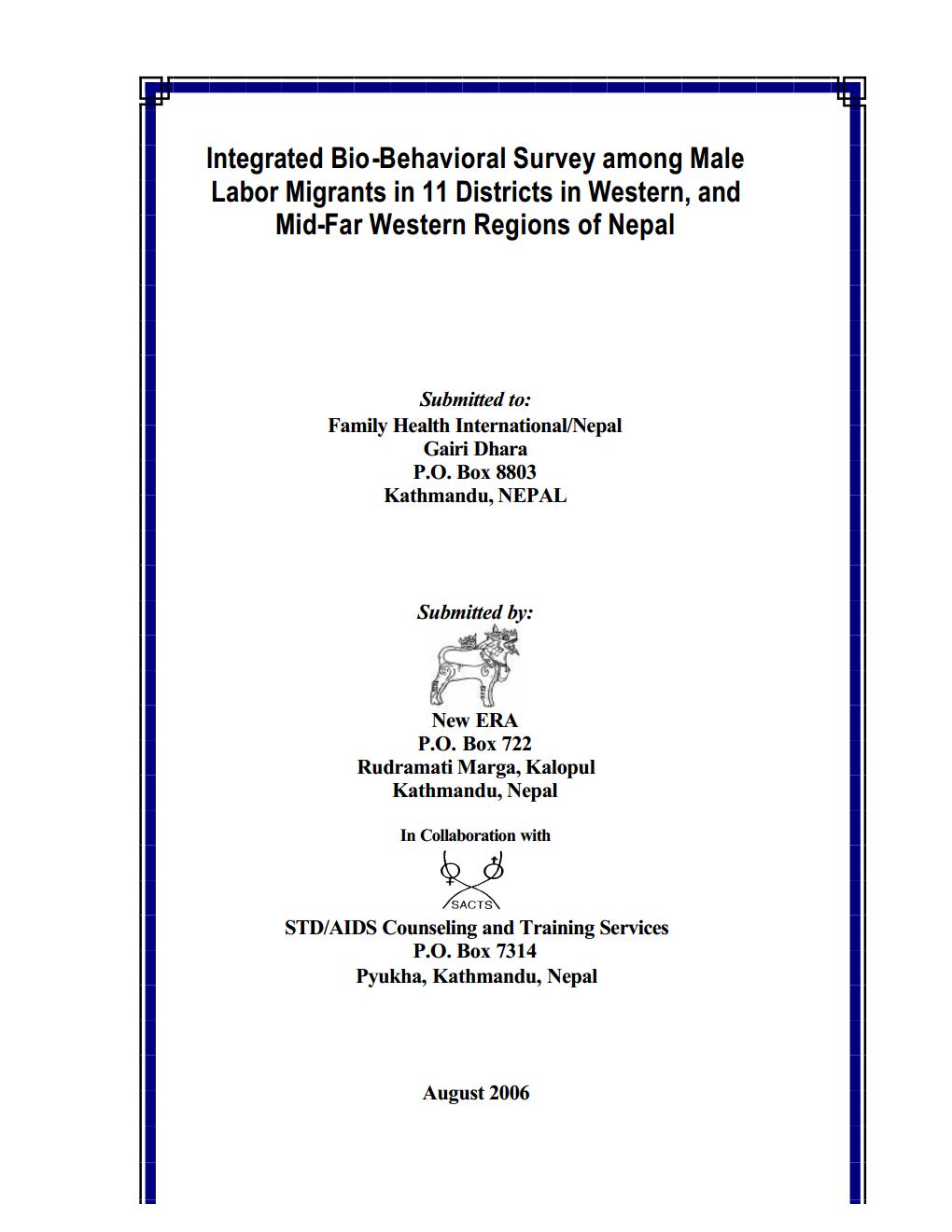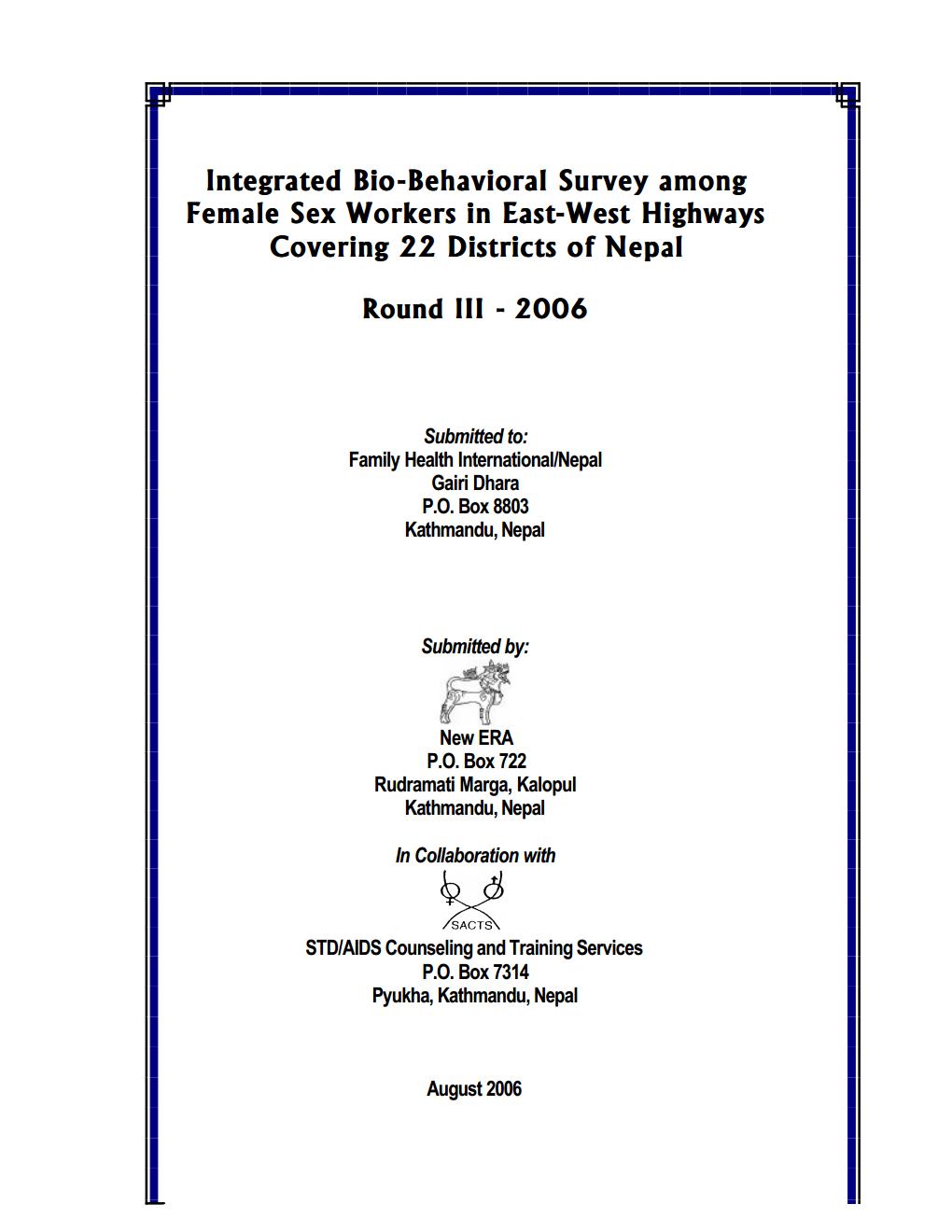The main objective of this study was to determine the impact of HIV/AIDS on children and communities including coping mechanisms in the four selected districts of western and far-western development regions of Nepal. The study also ascertained the number of children and families affected by HIV/AIDS; determined family coping strategies and current mechanisms for support for AIDS affected families; and assess safety nets for protection of vulnerable children, legal framework for protecting the rights of HIV/AIDS vulnerable children and adolescents, overall system of delivery of basic services and care for orphans and other vulnerable children including families. The made recommendations based in the analysis of data for designing community-based interventions and essential services benefiting children and communities.
Report Type: HIV/AIDS
A Qualitative Study on Coping Mechanisms of People Infected with and Affected by HIV/AIDS
This study aim was to exploring and analyzing the major socio-economic and psychological problems and challenges faced by people infected with and affected by HIV/AIDS (PLWHAs). The study ascertained the coping mechanisms/strategies of PLWHAs. The study analyzed the major problems, issues and challenges of PLWHAs. The study assesses the access of PLWHAs to treatment services; effects on women and children of the HIV- infected families; home-based care and community support for PLWHAs. The study adopted an anthropological qualitative technique to gain the understanding of the coping mechanisms of infected with and affected by HIV/AIDS.
Behaviour, Information and Services Survey (BISS) of HIV/AIDS among Young and Adults
Information about the health status of young adults, including their reproductive health and the prevalence of HIV/AIDS, is extremely important to improve the quality of life of youth and young adults and to provide valuable insights into issues that have a profound impact on future generations. This study examines the interrelationship between youth/young adults and HIV/AIDS in Nepal. The study assesses the knowledge, attitude and practices of youth/young adults in relation to HIV/AIDS, sexual risk and protective behaviors; impact of the conflict on HIV/AIDS; and access to information on reproductive health, HIV/AIDS and STIs.
Integrated Bio-Behavioral Survey among Male Labour Migrant in 11 Districts in Western, and Mid-FarWestern Regions of Nepal-2005
This is the first round of the Integrated Bio-Behavioral Survey (IBBS) conducted among male labour migrant from 11 districts of Western development, Mid-western development and Far-western development regions of Nepal. The study was to determine the prevalence of HIV among the returnee male labour migrants from India. The study assesses the HIV/STI risk related behaviors, socio-demographic characteristics, sexual and drug using behaviors, knowledge of HIV/AIDS, knowledge and treatment of STI problems and the knowledge and use of condoms by study community. The health personnel among the study team provided syndromic treatment of the the STI problems
Integrated Bio-Behavioral Survey among Female Sex Workers in East-West Highways Covering 22 Districts of Nepal
This is the third round of the Integrated Bio_Behavioral Survey (IBBS) conducted among female sex workers (FSWs) from 22 districts of terai highway of Nepal. The study was to determine the prevalence of STDs such as HIV, Neisseria gonorrhoeae (GC), Chlamydia trachomatis (CT) and Syphilis among Female Sex Workers (FSW’s) working at East – West highways sites. The study assesses socio-demographic characteristics, knowledge of HIV/AIDS, knowledge and treatment of STI’s, knowledge and the use of condoms, and exposure to available HIV/STI services from female sex workers study districts and to relate them with HIV and STI infection. The health personnel among the study team provided syndromic treatment free of cost to those testing positive for the STI problems.
Behavioral Surveillance Survey among Bhutanese Refugees and Selected Host Community Sites in Eastern Nepal
The primary objective of this study was to assess HIV risk-related behavior among Bhutanese refugees and to investigate whether there are sexual links or bridges between the refugee population and the host-community population. The study assessed the knowledge, attitude and risk behavior of Bhutanese refugee youths and adults in relation to HIV/AIDS.
Baseline Survey of HIV/AIDS Program among Adolescents, Young Adults and Migrant Laborers in Six Districts in Nepal
This study was to obtain a baseline situation in relation to HIV/AIDS of adolescents, young adults and migrant laborers to India in six selected districts namely Achham, Doti, Banke, Rupandehi, Chitawan and Jhapa of Nepal. The study assesses the knowledge, attitude and practices (KAP) of HIV/AIDS; risk behavior that may potentially treggar transmission of HIV/AIDS; attitude towards social stigma and discrimination associated with the people living with HIV/AIDS. The study examined the patterns of care and types of support services available for HIV infected people in the study districts.
Clinical and Behavioral Surveillance Surveys (BSS) among Female Sex Workers (FSWs) and their Clients at Kathmandu and Pokhara
This study systematically measures and monitors (a) the HIV/STIs and the sex behavior of FSWs; and (b) the sex behavior of their male clients in the Kathmandu Valley and the Pokhara Valley including the surrounding highway areas. This was the first survey of its kind in the Pokhara Valley and surrounding highway areas.
Integrated Bio-behavioral Survey (IBBS) among Male Injecting Drug Users (IDUs) in Eastern Nepal, Round II
This second round of IBBS survey among IDUs in Eastern Nepal was designed to measure the impact of FHI intervention programs on the targeted risk group sub-population. The study compared the analyzed trends against the data from the first round survey. The study has assesses prevalence of HIV, injecting the sexual behaviors, proportion of IDU sub-population that could transmit HIV infection because of their practice of high risk injecting behavior and frequency of and the association between risk behavior HIV infection statuses among IDU sub-populations
Integrated Bio_behavioral Survey (IBBS) among Male Injecting Drug Users (IDUs) in Pokhara, Round II – 2004
This is the second round of the IBSS conducted among IDUs in Pokhara Valley. The objective of the study was to measure the impact of intervention programs among the target risk group IDUs and compare and analyze trends against the data from the first round. The study assesses the prevalence of HIV, injecting and sexual behaviors and measured the frequency of and the association between risk behavior and HIV infection status among target sub-population in the Pokhara Valley.







